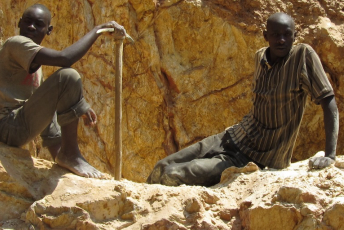Gold accounts for a sizeable portion of Tanzania’s export value earnings, overtaking tourism in 2020 as the country’s biggest foreign exchange earner. Yet year after year, the Tanzanian government reports massive smuggling of its gold by transnational criminal networks.
The amount of government revenue lost to smuggling should be going towards improving other service sectors of the economy. These include ongoing infrastructural projects such as the standard gauge railway, berths and roads, and socio-economic projects such as water and electricity connections. Instead, it is enriching criminals, both in and outside the country.
Gold smuggling networks in Tanzania are comprised of ‘local influential families’ who move the goods to contacts mainly in Kenya, South Africa, and India, says international tax specialist and Tanzania mining sector researcher Luckystar Miyandazi.
As with tanzanite, it is almost impossible for criminals to move gold without involving state officials. This is a persistent problem. In the past five years, Tanzania has changed its mining minister three times and suspended, reshuffled or laid off dozens of government officials implicated in gold smuggling. Last year five state actors were implicated in helping a criminal network to smuggle 27.4 kgs of gold worth US$1.25 million in June, and 15.4 kgs of gold worth US$776 000 in December. In 2019, suspects were arrested also attempting to smuggle 323.6 kg out of the country and so as has been for other preceding years.
Problems within the gold mining sector itself contribute to the smuggling. These include conflicts of interest between multi-national mining corporations and local miners, and a lack of enforcement of mining regulations resulting in non-compliance by mining companies.
There is a long-standing conflict between local small-scale artisanal miners and large-scale, foreign-owned mining corporations. At the onset of its independence in the early 1960s, Tanzania followed the ujamaa philosophy, which advocated policies that fostered self-reliance. While some African countries depended on international financial institutions to further develop their countries, Tanzania advocated progressing itself internally.
Ujamaa didn’t advocate for urbanisation, rather for the growth of village economies as the focal point for the collective progression of Tanzania’s economy and its people. Mining concessions were no longer allowed to be foreign-owned, and the informal, small-scale mining sector grew.
In the 1980s, the government shifted its policies to allow foreign-owned large-scale mining corporations to set up operations in the country, granting them ‘spatial enclaves’ – large mining parcels of land that were inaccessible to locals. The corporations brought with them modern mining technology and access to the global gold market. This of course made it almost impossible for the artisanal gold miners to compete and be successful in the sector. As a consequence most local artisanal miners export up to 90% of their gold illegally.
Added to this, mining companies partial or non-compliance with government regulations have resulted in unethical financial practices, including avenues for smuggling gold. Some of these practices include foreign mining firms not complying with tax and royalty directives and paying government only a portion of the required revenue.
The foreign corporations have also been accused of tax evasion through mis-invoicing, false accounting and under-declaring revenue. Other legislative concerns include bureaucratic business licensing and export permit procedures that are onerous and have also resulted in non-compliance by local miners.
These factors combine and the Tanzanian government finds itself caught between benefitting from foreign direct investment from international companies, dealing with colluding officials, and balancing these with the grievances of small-scale miners. There are fewer than 10 foreign gold mining corporations in Tanzania, yet over a million local artisanal miners, of which two-thirds are in the gold sector. The government seems caught between how best to honour the deeply-embedded ujamaa approach while accommodating the multi-national corporations and the revenue their enterprises yield.
Addressing the problems in the industry and the resultant gold smuggling in Tanzania is both complex (in the case of legislation and regulation) and emotive (in relation to the ujamaa philosophy) and will take time to fix.
While the late president John Magufuli vowed to address the challenges facing the gold mining sector, progress has been slow. In response to having one of the highest mining taxes in the world, the Mining Act was amended in 2019 and 2020 to revise taxation brackets for both multi-national corporations and local miners.
In February 2019, the government waived certain taxes for local firms and regulated others for foreign firms. Trading centres have been set up in gold-producing regions to give miners access to a regulated market rather than an illicit one.
These steps are valuable in as far they are the beginning of the processes to address the problem of gold smuggling. Streamlining the registration of local miners while lessening bureaucracy in licensing and export permit procedures is a further necessary step. Mechanisms to resolve conflict between small-scale miners and corporations is an urgent task for the government, and here cooperatives or unions could be established for local miners to provide a platform for dialogue where their concerns could be addressed, and mutually beneficial agreements are proposed and taken forward. Such positive steps would enable small-scale artisanal miners to make a living alongside the multinational corporation operations.
Limiting and disrupting state officials who aid and benefit from criminal networks is another complex challenge. Financial corruption, which allows foreign corporations to get away with flouting government directives, must be held to account. These steps will work towards ensuring that individuals and corporations working with state actors in the illegal market should be investigated and brought to justice, and ideally smuggled gold should be recovered, with proceeds accruing to the state coffers.
In April 2021, President Samia Suluhu Hassan directed her government on the need to strike the necessary balance in resolving these key issues. In her speech, the president mentioned that dialogue between actors in the mining sector was crucial. Decisive government action through law enforcement and the current political will of the new administration may make Tanzania use its existing frameworks to build on tackling these problems from many angles, and reap greater benefits for its people.
Mohamed Daghar, Regional Coordinator – Eastern Africa, ENACT project, ISS
Photo © African Mining Brief







